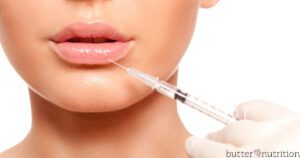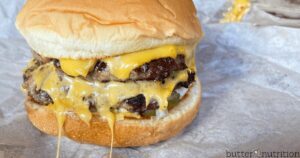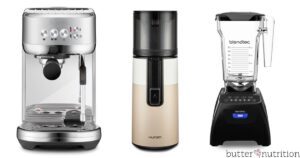 While I don't particularly like supplements, especially synthetic supplements for various reasons I've discussed previously here, there are a few whole food supplements that deserve special attention. My largest frustration with supplements is that they really shouldn't be used unless you already have a solid nutrition foundation, and you have a good reason to supplement - ie. knowledge that you need it from testing (like hair analysis) or a specific recommendation from your healthcare professional.
While I don't particularly like supplements, especially synthetic supplements for various reasons I've discussed previously here, there are a few whole food supplements that deserve special attention. My largest frustration with supplements is that they really shouldn't be used unless you already have a solid nutrition foundation, and you have a good reason to supplement - ie. knowledge that you need it from testing (like hair analysis) or a specific recommendation from your healthcare professional.
With so many choices out there the supplement game can be a dangerous one, as it is incredibly hard to know the ones that will work well for your body, and which ones are just well-marketed garbage. Time and time again, I run into clients taking supplements that are actually stressing their body out more than they are helping (especially synthetic vitamin D, calcium, and liver support supplements), so it's always best to work with a health advocate when picking out your synthetic or whole food supplements. That said, it also helps to use supplements properly sourced from whole food with attention to quality, as they can be a game changer for your nutrition (and much more easily tolerated by your body). You'll notice my list is made up mostly of whole food supplements, because it's that important to use whole food supplements as much as possible.
Here's my top 10-ish supplement picks that my home is never without (in no particular order):
1. Activated Charcoal
Did you know your liver regularly dumps toxins into your bile to flow out of your body? What most people don't know is that 95% of this bile that is released at the beginning of your small intestines gets reabsorbed and recirculated at the end of your small intestines. This process, called enterohepatic circulation helps your body recycle bile for re-use, but it can also lead to the recirculation of toxins too! Adding some fiber or activated charcoal can help act like a sponge to soak up more bile and toxins in your stool and prevent recirculation.
Activated charcoal can cause constipation, so don't try unless you're very regular (use fiber as a binder instead).
2. K2
Vitamin K2 is greatly underestimated in the nutrition world. It has amazing perks in your daily diet, like cancer prevention, supports healthy sex hormone production, and can even help to normalize testosterone levels by raising them in men, and lowering them in women (think PCOS). K2 also has the very important job of telling your body where to deposit calcium, so it knows to place it in your bones and teeth instead of in your kidneys (kidney stones) and blood vessels (heart disease). K2 is found is only found in fermented plant foods and animal foods, but is also made in the body from your beneficial gut bacteria, that is, if your gut is in good shape.
3. Topical and Oral Magnesium
Magnesium deficiency is all too common. It likely also affects you, because it's estimated that 68 to 80 percent of Americans are magnesium deficient. This should not be surprising because magnesium is needed for over 300 biochemical reactions in the body; however, it is not sufficient in the food supply, and it is also wasted by your body during times of stress. The Recommended Dietary Allowance (RDA) of magnesium is 400-420mg for men and 310-320mg for women; these values are not getting met through the average (or even stellar) diet.
Here are a few of my favorite transdermal and oral ways to get magnesium (I use both):
Magnesium lotion (topical)
Magnesium spray (topical)
Magnesium Malate (oral)
Magnesium Glycinate (oral)
Magnesium Orotate (oral)
Note: My favorite way to check your magnesium level (along with all the other minerals) is hair analysis. That way you can target your nutrition in the smartest way, by actually knowing what your body needs instead. Because if you aren't testing, you're really just guessing! Hair analysis is my favorite secret nutrition hack for getting the most out nutrition supplements, and without spending money on stuff you don't actually need.
4. Bone Broth and/or Collagen Protein
Collagen protein has a unique and very non-inflammatory amino acid profile, which primarily consists of glycine, glutamic acid, proline, and alanine. Even though your body can make these amino acids (called non-essential), if you're eating a low nutrient diet or have a stressed liver, chances are you are not able to manufacture all the non-essential amino acids that you body actually demands. In particular, the liver needs an abundance of glycine (the biggest constituent of collagen) to fuel phase 2 detoxification in the liver and help your body "take out the trash."
While the best way to get collagen is bone broth because you get minerals to go along with the collagen, here are a few supplemental options:
5. Whole Food Vitamin C
You may already take a daily vitamin C supplement, but is it a synthetic one? Synthetic vitamin C supplements are particularly troublesome, as ascorbic acid is not true vitamin C, but instead just a synthetic version of true vitamin C's outer shell. Check your supplement label, and if it says ascorbic acid, you're just getting one isolated component of vitamin C, which is hardly the real deal!
While the vitamin C RDA for adults 19 years and older is 75-90 milligrams (mg), 75mg for women and 90mg for men, experts like Dr. Suzanne Humphries claim that is a gross underestimation of the actual need. She suggests a more ideal minimum RDA would be almost double that, at 125-150mg/day. Please note: you may need even more if you are under chronic stress, drink alcohol, take birth control, or some pharmaceutical drugs, so work with your health advocate to help take these variables into consideration for you.
You can get enough vitamin C pretty easily from fruit in your diet.
6. Omega-3 Fatty Acids
Omega-3 fatty acids are extremely important for cell membrane health, which has big implications for the 30 trillion cells in your body, and your health as a whole. Omega-3s help counteract the more inflammatory omega-6 oils consumed in the diet (naturally obtained or through processed foods).
I get scientific with my intake of Omega-3s so I can take exactly what my body needs based on testing. Omega fatty acid testing will actually show you the health of your cells and your inflammation status, so you can literally calculate exactly how much you need in your diet to support your body in a really big way. Find out more about omega-3 fatty acid testing here.
If you can't reach your needed omega-3 target through low-mercury seafood, algae oil is one of my favorite sources. Micro algae is actually where fish obtain their omega-3s, so you too, can go straight to the source.
7. Mushrooms
Mushrooms are an underutilized beneficial food providing potent immune therapy and even have fighting cancer properties. They are also rich in nutrients such as B vitamins, Vitamin D, iron, and potassium. According to Spirit of Change Magazine, "The medicinal uses of mushrooms goes back to Neolithic man's history. The oldest human mummy, dating back 4,000 years ago, was found with Piptoporus betulinus in his medicine kit, a mushroom used for its antibiotic properties and as a natural parasite killer, still in use today." (1, 2, 4)
Some of the most therapeutic mushrooms include those of Mesima (Genus Phellinus), Reishi (Ganoderma Lucidum), Chaga (Inonotus Obliquus), Turkey Tail (Trametes Versicolor), Cordyceps sinensis, Lion's Mane (Hericium enrinaceus) and Maitake (Grifola frondosa). Because mushrooms are a natural food or fungus, they cannot be patented by drug companies (and thus profited) which is why they don't get nearly enough attention or funding for scientific research. However, the current mushroom research is very suggestive and promising showing anti-viral, anti-tumor and anti-cancer effects from these delicate fungi that may help regulate the immune system. (1, 3)
Here are few of my favorite mushroom supplements that I like to keep in my whole food supplement arsenal:
8. Beets or beet juice
Beets and beet juice are wonderful whole food supplement for liver and bile support. Beets are an amazing liver detox and beauty food (I love taking a "shot" of this stuff when I don't have fresh beets on hand). They have the ability to help thin your bile, which allows the body to detox more efficiently. A common problem is sluggish/stagnant bile flow. After toxins are neutralized in the liver, they are dumped into the bile (bile duct is a river for toxins to move out of the body) and when the bile gets too thick, toxic matter can't flow out of the body quick enough (leading to fatigue, low energy, constipation, PMS, toxicity and disease). Regular beet consumption (and a nutritionally wealthy diet) can help strengthen this process naturally.
9. Lysine
Earlier this year I started doing some research on hidden viral activity in the body, often causing a host of health issues, but at a minimum appearing as fatigue (fatigue that is not caused by not eating enough or low thyroid function). If you're curious if viral activity could be the cause of your fatigue, find a doctor or naturopath to run a full viral panel for you, and you may be surprised how many you test positive for (I sure was). Once you have a virus in your body, it never goes away. If you're healthy the viruses often stay dormant, but if your health is below par or you have prolonged stress, antibiotic overuse, vaccinations, toxic lifestyle, and/or surgeries, the viruses can be reactivated. A classic example of this is when you or someone you know gets a cold sore when they're under a lot of stress, as cold sores are caused by the herpes simplex virus.
This is where #9 comes in. Lysine is an amino acid, or a building block of protein that is great for immune system support. Specifically, I love it because it has anti-viral properties and is said to actually inhibit viral replication. This makes it extremely helpful for knocking down viruses in your body, and giving your immune system some well-needed support. It's also said to be therapeutic for Epstein Bar Virus sufferers, herpes outbreaks, cold sores, warts, and can act as a central nervous system anti-inflammatory. [6,7,8]
10. Monolaurin
This is also very important for viral issues as monolaurin is derived from coconut oil with general antibacterial, antifungal, and antiviral properties [9,10]. Monolaurin acts as an antimicrobial agent, and biofilm disruptor (bacteria can form biofilm which helps protect it from your immune system). According to a study out of the Respiratory Virology Branch, Centers for Disease Control in Atlanta Georgia:
"Monolaurin alone and monolaurin with tert-butylhydroxyanisole (BHA), methylparaben, or sorbic acid were tested for in vitro virucidal activity against 14 human RNA and DNA enveloped viruses in cell culture. At concentrations of 1% additive in the reaction mixture for 1 h at 23°C, all viruses were reduced in infectivity by >99.9%" [10]
How does your diet measure up? (remember: diet first, supplements second!)
Don't forget, supplements are just the icing on the cake of your nutrition plan. Find out if your diet is giving your body what it needs with the Nutritional Debt Quiz, because if your diet is not adding up, you are wasting your money on supplements!
What's your whole food supplement plan? Please share in the comments!
PIN IT:
References:
[1] https://www.ncbi.nlm.nih.gov/pmc/articles/PMC3339609/
[2] http://www.fungi.com/blog/items/nutritional-properties.html
[3] https://www.ncbi.nlm.nih.gov/pubmed/22701186
[4] http://www.spiritofchange.org/Spring-2016/A-History-of-Medicinal-Mushrooms/
[6] http://umm.edu/health/medical/altmed/supplement/lysine
[7] https://www.drugs.com/npc/lysine.html
[8] Medical Medium
[9] http://www.ncbi.nlm.nih.gov/pubmed/27366648
[10] http://onlinelibrary.wiley.com/doi/10.1111/j.1745-4565.1982.tb00429.x/full#fn1
[11] http://chrismasterjohnphd.com/2016/12/09/the-ultimate-vitamin-k2-resource/
[12] http://umm.edu/health/medical/altmed/herb/turmeric
[13] http://nutritiondata.self.com/facts/beef-products/3468/2







Sheila says
Hi. Thx for this.
Surprised you did not list Vitamin E, niacinamide, nor aspirin.
Would like to know your thoughts.
Regardless, love your blog.
Thx for all you do.
Alesea says
You mean raw beets?
Eileen Diaz says
yes. or beet juice
Anne says
I take almost all of these. Do you have a Vitamin D3 you recommend as well?
Catherine says
I'm not a fan of vitamin D.
Judith says
Beets,
Is it better to have grated beets, beet juice or fermented beet juice as in making kvass?
Thanks
Cat says
Have you checked out protandim?
Lesley Standridge says
I take Plexus products which are Pro Bio 5, Bio Cleanse, XFACTOR.multi-vitamin with Aloe infused, Turmeric /black pepper capsules, L - lysine, Olive Leaf extract capsule form
Burt Furuta says
Great website. I'll have to come back and read more.
One comment on vitamin K2 from chickpeas. Conventional and even organic chickpeas have lots of glyphosate residue. See Moms Across America blog post at http://www.momsacrossamerica.com/some_healthy_foods_are_poisoning_us
Click on the link to Tony Mtra's book on glyphosate in foods for more details.
Surprisingly, soybeans, even conventional, have relatively little glyphosate residue.
I make natto using organic Great Northern beans and eat some almost every day.
Lynette says
thanks for the informative post and recommendations.
if you could maybe explain the benefits of bee pollen? have heard some people with very good feedback on it, but not quite sure exactly what its for?
thanks!x
WENDY SPEZOWKA says
Hi Lynette, My family and I take BEE POLLEN it is a great way to get you B vitamins using a food source.so you don't have to take a multi B in pill form:)
nadeem aslam says
Screw the omega 3 Vitamin E is more important. Ask Matt
Blackburn.
Catherine says
Hi Nadeem,
It sounds like you are referencing someone who aligns with Ray Peat's philosophy. I am very familiar with that, however, after working with hundreds of clients a one-size fits all approach does not work and is not helpful. The best way to find out what an individual needs in terms of fatty acids, is by testing. For instance, genetics plays a big role here (especially FADS1 gene expression). I notice some Ray Peaters have a great deal of cellular inflammation which responds well to omega-3s.
Abundantly,
Catherine
Dawn Smith says
I wish you would put your dosage amount for example monolauren, to many conflicting articles on internet so would love to know the smallest effective dose you take??
Maartje says
Good afternoon
I can get organic chicken liver here (or beef but I watch for NeuG5C) I saw hearts but not organic....what do you say about that?